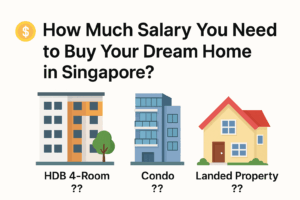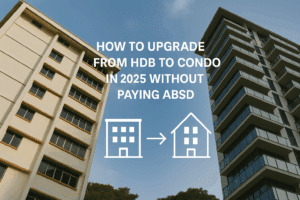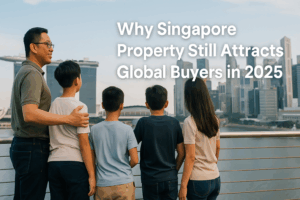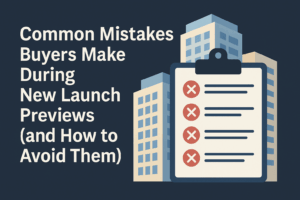Buying a condo in Singapore as a foreigner has become one of the most sought-after investment moves in Asia. With its stable economy, robust rental market, and transparent legal system, Singapore continues to attract global investors who value both growth and security.
However, while the city-state welcomes foreign ownership in private properties, there are specific rules, taxes, and processes that every international buyer should understand before taking the plunge. This guide will walk you through everything — from eligibility and financing to taxes, ownership laws, and even where to buy your dream condo.
If you’ve ever wondered, “Can foreigners buy a condo in Singapore?”, the answer is yes — but with important conditions and costs to note.
What Types of Property Can Foreigners Buy in Singapore?
Foreigners buying property in Singapore need to navigate clearly defined ownership laws. The Singapore government differentiates between public housing (HDB flats) and private housing, and each category has its own set of regulations.
- Private Property: Foreigners can freely purchase private condominiums, whether new launches or resale units. This includes luxury developments across prime districts like Orchard and Marina Bay.
- Public Housing: HDB flats are reserved for Singapore Citizens and Permanent Residents (PRs). Foreigners are not allowed to buy new or resale HDBs.
- Landed Property: Buying a landed home (bungalow or terrace house) requires special approval from the Land Dealings Approval Unit (LDAU). Such approvals are rarely granted unless the buyer demonstrates a significant contribution to Singapore’s economy.
In short:
- Foreigners can buy private condos
- Foreigners cannot buy HDB flats
- Foreigners need approval for landed properties
This makes condominiums the top choice for foreign investors entering Singapore’s real estate market.
What Types of Condos Can Foreigners Buy?
Foreigners can explore several types of condominiums depending on budget, investment goals, and ownership timeline.
Private Condominiums
These are the most common options. Foreigners can buy new launches (direct from developers) or resale units from existing owners. New launches often provide modern facilities, developer warranties, and potential capital appreciation, while resale units may offer better locations or lower entry prices.
Executive Condominiums (ECs)
These start as public-private hybrid housing but are fully privatized after 10 years. Only at that stage can foreigners buy ECs freely. If an EC is less than 10 years old, foreigners cannot purchase it.
Landed Properties
Foreigners who dream of owning a landed home must obtain written approval from the LDAU. Typically, approval is only granted for properties in designated areas or to those who hold Singapore PR status and have made significant economic contributions.
Key takeaway:
If you’re a foreigner, private condominiums and resale ECs (10 years and older) are your best options.
Taxes and Fees to Expect
Before buying a condo, it’s vital to understand Singapore’s property tax structure for foreigners. Here’s what to expect:
Buyer’s Stamp Duty (BSD)
BSD is payable on all property purchases in Singapore. The tax rate increases progressively with property value.
BSD rates based on IRAS as of February 2023:
Additional Buyer’s Stamp Duty (ABSD)
Foreigners are required to pay ABSD at 60% on top of BSD (verify latest rate before purchase).
However, citizens from countries with Free Trade Agreements, such as the United States, Iceland, Liechtenstein, Norway, and Switzerland, are treated as Singapore Citizens for ABSD purposes, meaning they pay 0% ABSD on their first property.
Other Costs
- Legal Fees: Around S$2,500–S$4,000 for conveyancing.
- MCST Maintenance Fees: Monthly contribution to condo upkeep (typically S$300–S$700).
- Property Tax: Annual tax based on annual rental value.
- Agent Commission: Usually 1–2% of the property price (paid by the seller).
Understanding these costs helps prevent surprises during the transaction. Try our BSD Calculator here.
Financing Options for Foreign Buyers
When it comes to buying a condo in Singapore as a foreigner, one of the most important factors to consider is how you will finance your purchase. The good news is that foreigners can obtain a home loan from Singaporean banks, but the terms are generally more restrictive than those offered to Singapore citizens or Permanent Residents (PRs).
Understanding the rules, limits, and best practices for foreign property financing is essential to make a smart, compliant, and cost-efficient investment.
Can Foreigners Get a Home Loan in Singapore?
Yes, foreigners are eligible to apply for housing loans from local banks and financial institutions, but the approval process is more rigorous. Banks evaluate several risk factors, such as:
- Your residency status (whether you live and work in Singapore or abroad),
- Your income source and stability, and
- The country of your main income or assets.
Generally, foreign investors working in Singapore with a valid Employment Pass (EP) or S Pass stand a better chance of obtaining a favorable loan package. Non-resident foreigners such as overseas investors may still qualify, but the bank will assess their creditworthiness, income documentation, and foreign exchange exposure more stringently.
Loan-to-Value (LTV) Limits
The Loan-to-Value (LTV) ratio determines how much of the property’s price you can borrow relative to its appraised value.
For foreign property buyers, Singaporean banks typically offer LTV ratios between 55% and 75%, depending on several factors.
Let’s take an example:
If you’re purchasing a condo worth S$2,000,000, and your bank approves a 65% LTV, you can borrow S$1,300,000, while the remaining S$700,000 must be paid upfront in cash.
Down Payment
Since foreigners are not eligible for CPF (Central Provident Fund) usage, the entire down payment must be paid in cash or equivalent funds from abroad.
In total, expect to pay at least 25% upfront before the loan is granted. Some banks may request higher cash contributions if your income is overseas-based or your credit history is limited.
Documents Required
When applying for a home loan, Singaporean banks require a comprehensive set of documents to verify your financial credibility and ability to service the loan.
- Passport copy (valid for at least 6 months)
- Employment Pass or Work Visa (if employed in Singapore)
- Proof of Income: Latest 3 months’ payslips and annual tax statements (e.g., Notice of Assessment)
- Bank Statements: Minimum of 3–6 months showing salary credits or business income
- Proof of Residence: Utility bills or tenancy agreement (if applicable)
- Credit Report: From your home country or an international credit bureau
Some banks may also request asset proof (such as investment statements or property deeds) for non-resident applicants to assess financial stability.
Bonus Tips for Future-Proof Investing
- Engage with a licensed real estate agent or qualified conveyancing lawyer familiar with foreign transactions
- Buy Freehold or 999-Year Leasehold Condos for long-term ownership flexibility.
- Avoid Over-Leverage: Don’t stretch beyond 70–75% financing; banks can revalue your property lower during downturns.
- Consider Joint Ownership: If buying with a Singaporean spouse or PR, you may qualify for lower ABSD rates.
- Monitor Policy Updates: Singapore adjusts property cooling measures periodically — always check the latest LTV, TDSR, and ABSD rates before committing.
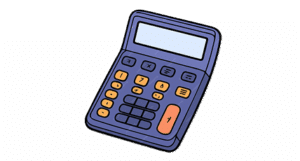
Step-by-Step Guide to Buying a Condo in Singapore
Here’s how foreigners can buy a condo in Singapore smoothly:
- Research and Shortlist Projects: Explore developer websites, property portals, and agent listings.
- Engage a Property Agent: Licensed agents offer market insights, negotiation skills, and legal compliance guidance.
- Visit Showflats or Viewings: Inspect the property’s condition, location, and facilities.
- Pay the Option Fee: Usually 1% of the purchase price to reserve the unit.
- Hire a Lawyer: For conveyancing and contract review.
- Exercise the Option to Purchase (OTP): Pay the remaining 4% of the down payment within the option period.
- Pay BSD and ABSD: Within 14 days of signing the Sale & Purchase Agreement.
- Finalize the Loan: Secure bank financing and complete legal paperwork.
- Collect Your Keys: Congratulations — you’re now a Singapore property owner!
This process typically takes 8–12 weeks from start to finish. For a more detailed guide on buying a condo, read our guide here.
Best Areas in Singapore for Foreign Condo Buyers
Singapore’s condominium market is neatly divided into three main regions each catering to different lifestyles, budgets, and investment goals. Understanding these regions helps foreign buyers identify the best areas to maximize rental yield, capital appreciation, and personal comfort.
Core Central Region (CCR): Prime Luxury and Prestige
The Core Central Region (CCR) represents Singapore’s most prestigious and internationally recognized addresses. It includes Orchard Road, River Valley, Marina Bay, and Sentosa Cove, areas synonymous with luxury living and high-end investments.
Rest of Central Region (RCR): Balance of Value and Accessibility
The Rest of Central Region (RCR) offers a sweet spot between affordability and location. Areas like Novena, Tanjong Rhu, Redhill, East Coast, and Kallang are just minutes from the CBD, providing convenient commutes and vibrant communities.
Outside Central Region (OCR): Family-Friendly and Long-Term Growth
The Outside Central Region (OCR) covers suburban neighborhoods like Tampines, Bukit Timah, Woodlands, and Pasir Ris, which appeal to families and long-term residents. With more space and greenery, these areas provide a calmer lifestyle at lower costs.
Each area offers unique benefits, from elite schools and malls to sea views and business hubs.
Legal and Practical Tips for Foreign Buyers
As a licensed real estate agent in Singapore, I’ve helped many foreign clients navigate the property market safely and confidently. Buying a condo here is straightforward once you understand the legal framework — but it’s the small details that make all the difference. Here are my most valuable, experience-backed tips to help you avoid common pitfalls and make a smooth purchase.
1. Work Only with Licensed Property Agents
First and foremost, always engage a licensed property agent registered with the Council for Estate Agencies (CEA).
This isn’t just about compliance; it’s about protecting your interests. A registered agent ensures every transaction follows Singapore’s regulations and that you’re not overpaying or missing crucial legal clauses.
2. Hire a Reliable Conveyancing Lawyer
Next, always engage a qualified conveyancing lawyer. Your lawyer will handle all legal documentation, check the property title, and ensure there are no hidden caveats or encumbrances on the unit you’re buying.
3. Confirm Developer Reputation and Property Tenure
If you’re purchasing a new launch condo, make sure you research the developer’s background. Stick to established names with proven track records of timely project completion and quality builds.
4. Secure Loan Approval Before Signing Anything
Before paying your Option Fee or signing the Option to Purchase (OTP), get In-Principle Approval (IPA) from your bank or mortgage broker.
5. Monitor Currency Exchange Rates Closely
If your funds are overseas, pay attention to foreign exchange rates when transferring large sums. The Singapore Dollar (SGD) is strong, and even small fluctuations can impact your overall cost by thousands.
Buying a condo in Singapore as a foreigner in 2025 is straightforward when you understand the local regulations, taxes, and procedures. Whether you’re investing for capital growth, rental income, or long-term residency, Singapore’s property market continues to offer transparency, stability, and profitability.
🚀 Stay Ahead in the Property Market!
Be the first to receive exclusive updates, launch reviews, insider deals, and real-time alerts — directly on your preferred app.
👉 Join our community now:
🌐 Spread Knowledge. Share with Others.
Click any of the icons below to share this content with those who may benefit from it.



